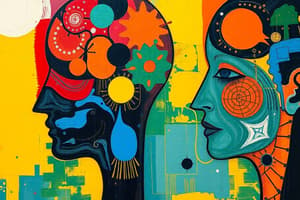Podcast
Questions and Answers
Which philosopher is considered one of the early influencers of existential psychology?
Which philosopher is considered one of the early influencers of existential psychology?
- Sigmund Freud
- Søren Kierkegaard (correct)
- Carl Rogers
- B.F. Skinner
What did Rollo May believe many people lack in relation to their destiny?
What did Rollo May believe many people lack in relation to their destiny?
- The ability to make choices
- Understanding of its significance
- Courage to face it (correct)
- Knowledge about it
Which modern existential psychologist is known for his works alongside Rollo May?
Which modern existential psychologist is known for his works alongside Rollo May?
- Abraham Maslow
- Victor Frankl (correct)
- Erik Erikson
- Carl Jung
What major concern did Søren Kierkegaard address regarding postindustrial societies?
What major concern did Søren Kierkegaard address regarding postindustrial societies?
Which of the following describes Rollo May's view on human responsibility?
Which of the following describes Rollo May's view on human responsibility?
What was the relationship dynamic within Rollo May's family during his childhood?
What was the relationship dynamic within Rollo May's family during his childhood?
Which of the following is NOT a focus of existential psychology, as discussed by Rollo May?
Which of the following is NOT a focus of existential psychology, as discussed by Rollo May?
Who were among the first existential psychologists that influenced the field?
Who were among the first existential psychologists that influenced the field?
What is the foundational idea of existentialism regarding existence and essence?
What is the foundational idea of existentialism regarding existence and essence?
Which term refers to the basic unity of person and environment in existential philosophy?
Which term refers to the basic unity of person and environment in existential philosophy?
What does alienation in existentialism manifest as?
What does alienation in existentialism manifest as?
Which of the following defines 'Umwelt' in existentialist terms?
Which of the following defines 'Umwelt' in existentialist terms?
What is the primary cause of anxiety according to existential philosophy?
What is the primary cause of anxiety according to existential philosophy?
What does the concept of 'Non-Being' primarily address?
What does the concept of 'Non-Being' primarily address?
How can the concept of 'Mitwelt' be described?
How can the concept of 'Mitwelt' be described?
How does existentialism view theories in relation to human existence?
How does existentialism view theories in relation to human existence?
What distinguishes normal anxiety from neurotic anxiety?
What distinguishes normal anxiety from neurotic anxiety?
Which of the following statements about ontological guilt is correct?
Which of the following statements about ontological guilt is correct?
What is the primary cause of separation guilt?
What is the primary cause of separation guilt?
In the context of neurotic anxiety, what happens to values?
In the context of neurotic anxiety, what happens to values?
What does intentionality provide in human experience?
What does intentionality provide in human experience?
Which aspect is not associated with normal anxiety?
Which aspect is not associated with normal anxiety?
How is guilt related to the perception of others according to the content?
How is guilt related to the perception of others according to the content?
What defines the concept of care?
What defines the concept of care?
How does May define 'will'?
How does May define 'will'?
What does May suggest about love and will in mature individuals?
What does May suggest about love and will in mature individuals?
Which form of love is characterized as 'disinterested love'?
Which form of love is characterized as 'disinterested love'?
What type of freedom is described as 'the freedom of doing'?
What type of freedom is described as 'the freedom of doing'?
How does May define 'destiny'?
How does May define 'destiny'?
According to May, how do freedom and destiny relate to each other?
According to May, how do freedom and destiny relate to each other?
Which of the following is NOT one of the four kinds of love identified by May?
Which of the following is NOT one of the four kinds of love identified by May?
What need does May identify within Western civilization?
What need does May identify within Western civilization?
What does May believe is the main malaise of modern times?
What does May believe is the main malaise of modern times?
How does May view the purpose of psychotherapy?
How does May view the purpose of psychotherapy?
What did May see as a crucial component of psychopathology?
What did May see as a crucial component of psychopathology?
Which concept does May emphasize as more important in understanding human behavior?
Which concept does May emphasize as more important in understanding human behavior?
What does May believe myths provide in society?
What does May believe myths provide in society?
In terms of personality development, where does May stand on the influences of conscious versus unconscious forces?
In terms of personality development, where does May stand on the influences of conscious versus unconscious forces?
What is a key characteristic of May's view on humanity?
What is a key characteristic of May's view on humanity?
Which of the following best describes May's approach to therapy?
Which of the following best describes May's approach to therapy?
Flashcards
Existential Psychology
Existential Psychology
A school of thought rooted in philosophy that emphasizes individual experience, freedom, and responsibility.
Rollo May
Rollo May
A key figure in existential psychology, who viewed people as responsible for their actions and destiny.
Existentialism Basics
Existentialism Basics
A philosophy emphasizing individual freedom and responsibility for choices, against dehumanization in society.
Kierkegaard's Influence
Kierkegaard's Influence
Signup and view all the flashcards
Søren Kierkegaard
Søren Kierkegaard
Signup and view all the flashcards
Freedom and Responsibility
Freedom and Responsibility
Signup and view all the flashcards
Dehumanization
Dehumanization
Signup and view all the flashcards
Courage to Face Destiny
Courage to Face Destiny
Signup and view all the flashcards
Existentialism
Existentialism
Signup and view all the flashcards
Being-in-the-World
Being-in-the-World
Signup and view all the flashcards
Alienation
Alienation
Signup and view all the flashcards
Umwelt
Umwelt
Signup and view all the flashcards
Mitwelt
Mitwelt
Signup and view all the flashcards
Eigenwelt
Eigenwelt
Signup and view all the flashcards
Non-being (Nothingness)
Non-being (Nothingness)
Signup and view all the flashcards
Anxiety
Anxiety
Signup and view all the flashcards
Normal Anxiety
Normal Anxiety
Signup and view all the flashcards
Neurotic Anxiety
Neurotic Anxiety
Signup and view all the flashcards
Ontological Guilt
Ontological Guilt
Signup and view all the flashcards
Separation Guilt
Separation Guilt
Signup and view all the flashcards
Mitwelt Guilt
Mitwelt Guilt
Signup and view all the flashcards
Eigenwelt Guilt
Eigenwelt Guilt
Signup and view all the flashcards
Intentionality
Intentionality
Signup and view all the flashcards
Care
Care
Signup and view all the flashcards
Love (in May's view)
Love (in May's view)
Signup and view all the flashcards
Will (in May's view)
Will (in May's view)
Signup and view all the flashcards
Existential Freedom
Existential Freedom
Signup and view all the flashcards
Essential Freedom
Essential Freedom
Signup and view all the flashcards
Destiny (May)
Destiny (May)
Signup and view all the flashcards
Forms of Love (Western tradition)
Forms of Love (Western tradition)
Signup and view all the flashcards
Freedom (May's view)
Freedom (May's view)
Signup and view all the flashcards
Myth's role in Western civilization
Myth's role in Western civilization
Signup and view all the flashcards
Myth's Nature
Myth's Nature
Signup and view all the flashcards
May's Communication Levels
May's Communication Levels
Signup and view all the flashcards
Modern Malaise
Modern Malaise
Signup and view all the flashcards
Psychopathology as Communication Breakdown
Psychopathology as Communication Breakdown
Signup and view all the flashcards
May's Psychotherapy Aim
May's Psychotherapy Aim
Signup and view all the flashcards
Teleology vs. Causality
Teleology vs. Causality
Signup and view all the flashcards
Conscious vs. Unconscious Influence
Conscious vs. Unconscious Influence
Signup and view all the flashcards
Uniqueness in Humanity
Uniqueness in Humanity
Signup and view all the flashcards
Study Notes
T.O.P. Prelim Lectures: Chapter 8 - Existential Psychology
- Course: Existential Psychology
- Topic: Overview of Existential Psychology
- Existential psychology is rooted in the philosophy of Søren Kierkegaard, Friedrich Nietzsche, Martin Heidegger, Jean-Paul Sartre, and other European philosophers.
- Early existential psychologists and psychiatrists include Ludwig Binswanger, Medard Boss, Victor Frankl.
- Rollo May believed people are responsible for who they become and that many lack the courage to face their destiny.
- Post-industrial societies show a trend towards dehumanization of people.
- Kierkegaard addressed both person's experience and experiencing person.
- Kierkegaard and later existentialists emphasized balance between freedom and responsibility.
Topic: Biography of Rollo May
- Rollo Reese May was born April 21, 1909, in Ada, Ohio.
- He was the first son of six children.
- He had a somewhat distant relationship with his parents.
- His parents frequently argued, and separated.
- He followed a course very similar to Erik Erikson's, 10 years earlier.
- His books, articles, and lectures established May as the best-known American representative of the existential movement.
Topic: Background of Existentialism
- Existentialism is interpreted differently by philosophers and psychologists.
- Common elements found in existential thought include: existence precedes essence, opposition to the subject-object split, search for meaning in life, responsibility for who one becomes, and anti-theoretical basis.
- The increasing dehumanization in postindustrial societies is a focus of existentialist thought.
- Basic concepts: Being-in-the-World; Alienation in three areas (separation from nature, lack of meaningful relationships, alienation from oneself).
- Three simultaneous modes in being-in-the-world: Umwelt (environment), Mitwelt (relationships with others), and Eigenwelt (relationship with oneself).
- Dread of not being (non-being or nothingness); Death is most obvious avenue, but fears can cause people to live defensively and avoid confrontation with non-existence.
Topic: The Case of Philip
- Philip, an architect, struggles with a complex and turbulent relationship with someone named Nicole.
- Their idyllic summer together morphs into concerns about marriage and growing mistrust.
- Philip experiences betrayal and abandonment.
- Philip's reaction to this love-loss reveals features of May's work around anxiety, intentionality, destiny, psychopathology, and psychotherapy.
- Philip sought therapy from Rollo May.
Topic: Anxiety
- Anxiety arises when people realize their existence or something connected with it may be destroyed.
- May defined anxiety as the subjective state of an individual realizing the potential destruction of their existence, thereby becoming nothing.
- The acquisition of freedom leads to anxiety.
- May differentiated between normal and neurotic anxiety.
- Normal anxiety is proportionate to the threat.
- Neurotic anxiety is disproportionate and involves blocking from awareness including repression.
- Normal anxiety can be positively productive when a person gains insight into their life; Neurotic forms lead to dogma instead of genuine understanding.
Topic: Guilt
- Guilt arises when people deny their potential, misunderstand others' needs, or are oblivious to their reliance on the natural world.
- Both anxiety and guilt are ontological rather than reactive.
- May identified three forms of ontological guilt: separation guilt, relational guilt, and self-imposed guilt (all based on different aspects of being-in-the-world: Umwelt, Mitwelt and Eigenwelt).
Topic: Intentionality
- Intentionality is the structure that gives meaning to experience and allows people to make future decisions.
- Without intentionality, people cannot choose or act.
- Intentionality is the structure of meaning that enables us as subjects to understand and interpret the objective world.
Topic: Care, Love, and Will
- Care is the opposite of apathy, a state where something matters.
- Love is delight in (and valuing) the presence and development of another, as much as one's own.
- Will is the capacity to organize oneself toward a certain goal or direction.
- May identified four kinds of love: sex, eros, philia, and agape (biological, psychological, friendship, and altruistic).
Topic: Freedom and Destiny
- Freedom is the ability to understand that one is determined.
- It comes from an understanding of one's destiny.
- Existential freedom represents freedom of action, freedom of doing.
- Essential freedom represents freedom of being.
- Destiny isn't preordained, but rather our goal or terminus.
Topic: The Power of Myth
- People in Western civilization feel a need for myths.
- Myths are not false but rather conscious and unconscious system beliefs for interpreting personal and social problems.
- Rationalistic language prioritizes truth, whereas myth prioritizes communication of an experience.
Topic: Psychopathology
- Defined by May as a lack of communication and interpersonal connection (inability to know others and to share oneself).
- Apathy and emptiness are major maladies of modern times.
- May views symptoms (like headache) as temporary or permanent, based on early childhood experiences.
Topic: Psychotherapy
- He advocated facilitating greater self-awareness/conscious experience to support freedom of choice.
- Psychotherapy should improve people, help them expand consciousness, and enable them to become more freely human.
- May viewed therapy as a combination of religion, science, and friendship.
Topic: Concept of Humanity: May's Existential Psychology
-
May valued notions of free will
-
May considered a nuanced view of human nature, without becoming overly pessimistic.
-
May emphasized teleology (understanding actions in context of future), rather than causality (cause and effect).
-
May supported that conscious and unconscious force play important role in development.
-
May supported that social & biological forces both play a role in development.
-
May emphasized uniqueness in human experience.
Studying That Suits You
Use AI to generate personalized quizzes and flashcards to suit your learning preferences.




